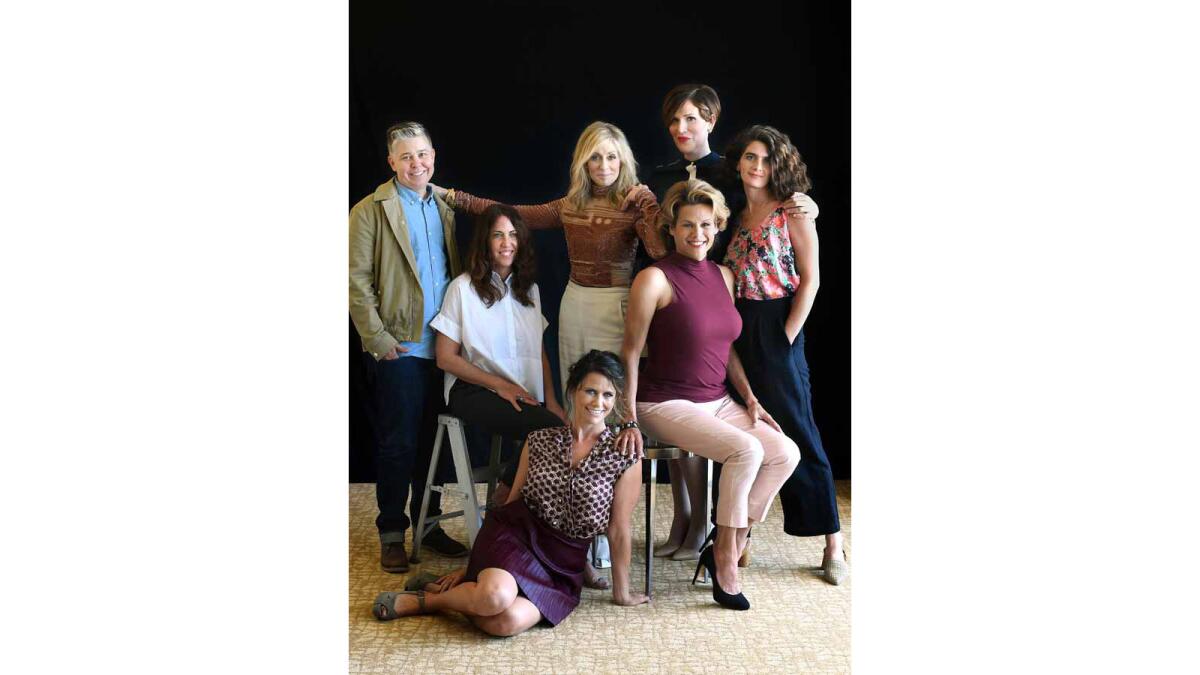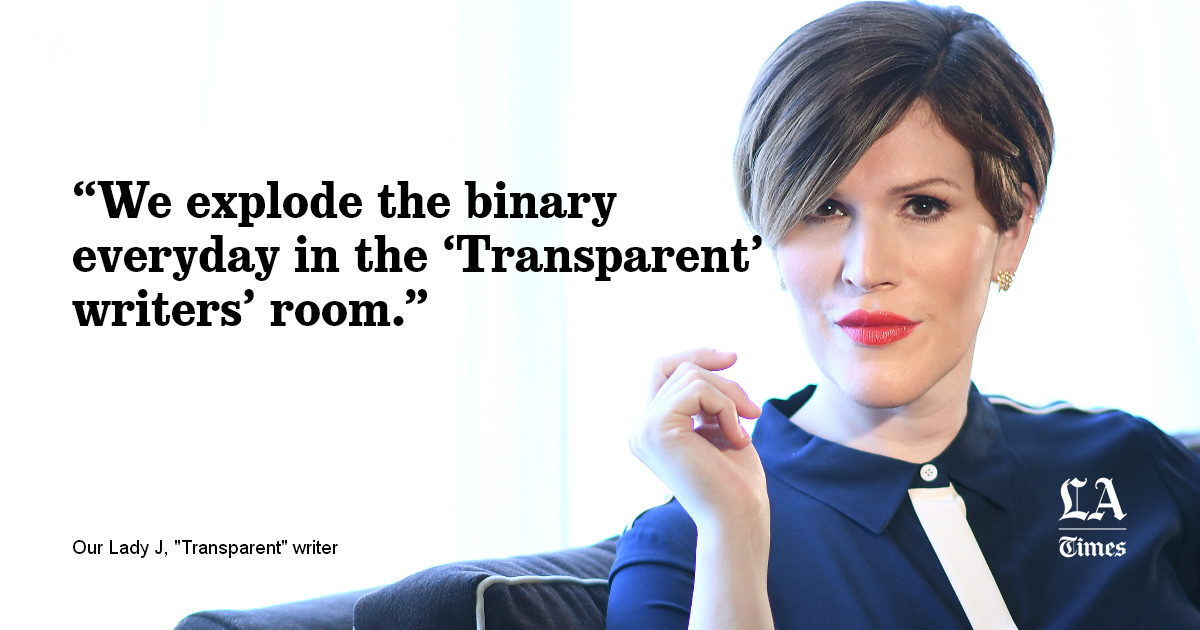How the women of ‘Transparent’ are working to ‘topple the patriarchy’

- Share via
When “Transparent” creator Jill Soloway won her second consecutive Emmy in directing for a comedy series last week, she ended her acceptance speech with a call to action that lighted up the Internet.
“Topple the patriarchy, topple the patriarchy!” Soloway chanted.
She certainly has been doing her part.
Now in its third season, “Transparent,” inspired by Soloway’s own experience of having a parent come out as transgender late in life, has helped normalize an often demeaned and stigmatized segment of the LGBT community. The series is also acclaimed for its bold and unflinching portrayals of women, each with her own journey of personal exploration.
Last month, the women of “Transparent ” — actors Alexandra Billings, Gaby Hoffman, Amy Landecker and Judith Light, as well as writers Ali Liebgott, Our Lady J, and Bridget Bedard — gathered to reflect on what has been achieved with the series. Soloway, whose new production company, Topple, aims to develop female-centric stories, was interviewed a few weeks later.
See the most-read stories in Entertainment this hour »
Hollywood’s track record for being inclusive has come under sharp focus. What strikes you about Hollywood’s gender problem?
Landecker: I’ve been seeing billboards all over town for movies recently and it’ll be a bunch of guys … and one girl who is about 25. Film still feels behind — TV seems more ahead of the curve, but still needs work. I am just like: Don’t we make up half of the population? I was on the plane with a producer on the way here and we were talking about it and he said that’s because women don’t sell. It’s just about economics. I refuse to believe that.
Light: I think it is incumbent upon us to put ourselves out there in a very important and prominent way. The more we talk about it, the more I think it’s going to be front and center.
Liebgott: The person with the checkbook has the power. I think the group behind the scenes at the studios, you know, if there’s not women in place in high positions, I just feel like that holds things [back]. That’s what I love about what Jill is doing. She is really making it a priority for women to direct on this show.
Jill, what did you set out to do as far as creating this space for women with this show — how conscious, or subconscious, was it?
Soloway: I think a little bit of both. In the sort of short-term, day-to-day thing, I was just trying to create a space for myself. I think it was very personal at first. Then as everything was happening, I’d always have a sort of automatic urge to share what I’m doing with other people. I started to look around and realized that a lot of those attributes that were serving me as a director were either feminine or feminist attributes. I started to feel like “Oh, I wish all women knew that in some ways it’s incredibly achievable, it’s not as hard as I thought my whole life.” I kind of felt like an evangelist and I had to spread the word.
What are the discussions like in the writers’ room, particularly in terms of the personal journeys we see from the women?
Soloway: One of the things I say most often is I want women to be the subject, not the object. We want them to be the “the” not the “that.” Because so many rooms are run by men they’re just used to women being the “that” — to be adored and dreamed about. I mean, I just saw something, this happened to be a casting call for a Dick Wolf show — I saw it on Twitter — and they were looking for a trans girl. The description was: “Dangerously hot. The kind of person you’d leave your wife and kids for.”
We don’t even have to consciously talk about the women or talk about female story lines, ever. We just are women, we are women writing television. There is no conscious effort to do anything except for telling our truth.
We just are women, we are women writing television. There is no conscious effort to do anything except for telling our truth.
— Jill Soloway, “Transparent” creator
You sometimes read about how a film or show might be different if it had a male or female at the helm. And it’s always interesting because it brings up stereotypes —
Landecker: Yes, it’s a tricky conversation. The so-called feminine or masculine qualities. We have a [director of photography] who is really sort of the mother on set in sort of the archetypal way. He shoots very emotionally. I feel like it’s about collaboration versus [having] a leader.
Soloway: There are a lot of men with feminine leadership styles and there are a lot of women with masculine leadership styles. Also, because there are so many trans and gender non-conforming people who are directors that even to talk about it in that binary way, I think, is living in the past.
How has working on this show changed the way you view and talk about gender?
Our Lady J: I have caught myself living a stereotype. What trans is, what the binary is, going about my day-to-day life as a non-passing trans person. I used to go about living my life in a way to avoid being called names and to just pass, to speak higher when I went to market so people don’t recognize my trans-ness. We explode the binary everyday in the “Transparent” writers’ room.
Billings: I remember a long time ago when I first transitioned — in 1980, when it was illegal — I had friends that said confidently, “Isn’t it exciting to think that we will all be one big family one day?” I used to think that’s a great idea. What this show has reminded me is that we can be a family and still revel in the individuality of our own human history.
Liebgott: We are in a bubble in L.A. We are in a really beautiful bubble to be able to make this show, even. It is very easy, though, to be placed back in reality. This morning when I was valeting my car, the guy said, “Thank you, sir.” It happens everyday, all day long, it was fine and I said, “Thank you.” He said, “I am so sorry.” I was like, now we’re going to have this awkwardness. And all I could think was “I don’t want to have to take care of you now.”

This show isn’t glossy — we see people at their worst and at their best and everything between. When you’re in a scene where your slouching in your underwear or having intimate moments in bathtubs, and people characterize it as being “brave,” does that make you want to scream?
Landecker: I remember the press junket was the first time I got all these questions about how brave I was, which was code for you look like ... basically. You don’t want to be called brave for showing who you are. I was told by my makeup artist, “You know you might want to stand up straight.” But I was like, she’s depressed and she needs to look how she feels. Then when it came out, I freaked out a little bit because of all the comments and I called Gaby. She was like. “That’s just because the world is not used to seeing women be without makeup and be themselves.”
Hoffman: First of all, it’s boring. Looking at somebody looking good is so ... boring. I don’t think there is anybody who’s watching television right now who wants to see something because it looks good rather than feel something because it feels right or familiar or new or whatever.
Do you keep track of some of these studies that have come out about female representation behind the scenes in Hollywood? Does it feel like we’ll ever get to an even playing field?
Soloway: I think people don’t really actually talk about what their real issue is, which is that white, cis men — not straight men, but cis men — have had their hands on the narrative ever since filmmaking has begun. [Note: cis, or cisgender, is a term used by some to describe people who are not transgender.] In doing so, they very naturally tell stories that resonate with themselves. They very naturally use women, people of color, queer people as objects in the story lines that they find interesting.
It’s not that cis men are doing anything on purpose, they’re just telling their own story, which is what we all want to do when we get our hands on the camera. So if most of the reviewers are white cis men, if most of the distributors are white cis men, most of the executives in history have been white cis men. Most of the people who have been giving awards to people are people who’ve already been in the business — retired white cis men. They’ve been creating a body of narrative forever.
You can have a couple of diversity programs — but come on. This is going to sound really crazy, but there isn’t going to be any room for these other voices unless the white cis men actually are just stopped. None of them are going to do that. They all still have careers. They still have houses to make payments on. They still feel completely alive because of their ambitions. And their ambition comes much more naturally to them. We are asking women to be comfortable doing this when women are punished for having desire and ambition in our culture.
Bedard: And they’re lucky to have us. We have to stop saying “Thank you” for the opportunity.
More to Read
The complete guide to home viewing
Get Screen Gab for everything about the TV shows and streaming movies everyone’s talking about.
You may occasionally receive promotional content from the Los Angeles Times.







